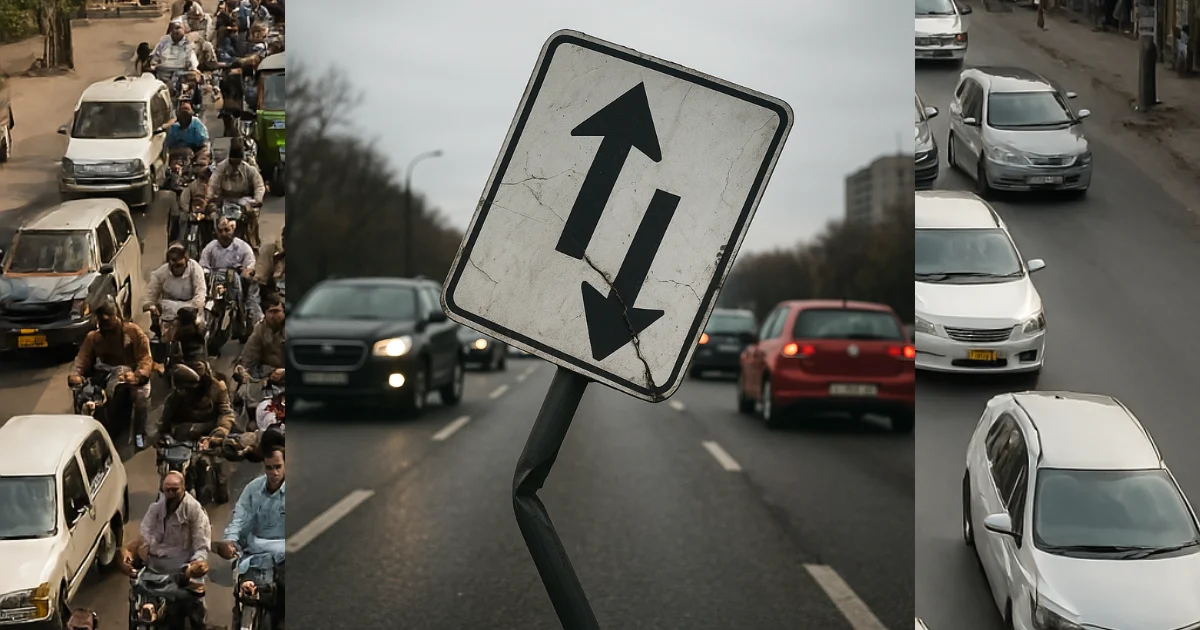It’s not unusual to see cars and motorcycles heading the opposite way in traffic on the congested streets of Pakistan’s cities. This is a pretty scary sight that happens all the time. People used to think that these kinds of activities were crazy mistakes, but now they are a typical part of city life. This phenomena is more than simply frustration or high gasoline prices; it includes overloaded motorbikes carrying three or four passengers (often youngsters holding firmly) and drivers who rush on the wrong side of the road without remorse.
It shows a broader problem: a society that is mired in moral and ethical quandaries, where personal convenience often wins out above public safety, and where the abuse of power, no matter how small or big, destroys the very foundations of civic obligation.
This article talks about how these difficulties are complicated, what they do, and how vital it is for people and society as a whole to think about their values.
The wrong side becomes the right side
In any society, there are unwritten rules about how to treat each other with respect and work together, especially in public settings. One of these shared spaces is the road, and traffic laws keep everything safe and in order. Driving on the wrong side of the road used to be an unusual thing to do in Pakistan, but now it’s common.
It’s not just how often these kinds of violations happen that is surprising; it’s also the way people think about them. When confronted, drivers often act like they have the right of way and are rude. This behavior shows a moral dilemma: do people put their own comfort ahead of the safety and rights of others? The answer seems to be yes more and more.
The acceptance of this kind of lawlessness is a change in society. When a lot many people do something wrong, it doesn’t seem wrong anymore. The shared sense of right and wrong fades, and what used to be wrong becomes normal.
The Decline of Ethics in Daily Choices
Ethical and moral dilemmas frequently arise in significant debates—politics, religion, business scandals—but they also present themselves in the quotidian decisions individuals make daily. Driving on the wrong side of the road is not a small thing; it is a choice to break rules that are meant to keep everyone safe.
This is the moral problem:
Individual vs. Collective Good: Should I put other people’s lives in danger to save a few minutes?
Is it worth putting kids in risk by overloading a motorcycle only to save time on repeated trips?
Personal Interest vs Social Responsibility: Are my needs more important than the community’s right to safe roads?
When a driver picks the wrong side, they are answering these questions, even if they don’t realize it. The scary truth is that the answers are getting more rude, selfish, and impatient with the law.
The Culture of Revenge and Abuse of Power
One cannot disregard another fundamental element: the psychology of retribution. When leaders block whole roads for their convoys, regular people can feel like it’s okay to break the rules too. A dangerous yet common belief is, “If people in power abuse their power, why shouldn’t I abuse the little power I have?”
This makes things worse for everyone, which weakens morals at every level. Leaders misuse their authority on a large scale, and regular people do the same on a smaller scale. Both behaviors arise from the same place, a willingness to put your own comfort, ego, or position ahead of the rights of others.
It makes things worse by creating a vicious cycle: people who are hurt by authority break the law more often, which makes things even worse. In this cycle, morality is not absolute; it is conditional. People make excuses for their bad behavior by pointing out others’ bad behavior.
The Function of Justifications and Excuses
Some people say that high gas prices make people take shortcuts, even if they are unsafe. Some people break the rules and then make excuses like “it’s too important,” “there’s no enforcement,” or “the infrastructure is bad.” Ignoring these factors does not free people from their obligations.
The true problem is rationalization, which is when people try to explain away bad behavior when it benefits them. Rationalization can dull the conscience, which is dangerous. It’s simpler to do something bad over and over again once you convince yourself that it’s okay.
When millions of people use this excuse, it becomes societal acceptance. An excuse might turn into a deadly habit.
The Society's Moral Mirror
Every time someone breaks the law on the road, it’s not simply a traffic problem; it’s a sign of a bigger moral problem. Roads are like a mirror that shows us how our conscience is doing. How can we expect people to be honest about bigger, more complicated issues like government, justice, or economic fairness if we can’t even follow fundamental norms that keep people safe?
When people of all ages drive down the wrong side of the road without feeling bad about it, we see a culture whose morality is no longer based on right and wrong, but on ease and pride. What makes ethical dilemmas so challenging is breaking down of the moral boundries. They make us wonder if we are making decisions based on what we think is right or what is best for us.
Teaching by Example: The Effect on Generations
When kids ride bikes with a lot of weight on them, they learn more than just how to stay safe. When kids see their parents breaking the law without fear, they learn that it’s okay to be mean, that rules don’t matter, and that it’s not a big deal.
Because faulty ideas are passed down from one generation to the next, things won’t just stay the same; they’ll get worse. People who drive tomorrow won’t think twice about the wrong side of the road; they’ll see it as usual, just like grownups do now.
Ethical Dilemmas in Everyday Life
Driving on the wrong side of the road shows that there are deeper moral issues to be consider.
In the workplace, favoritism take precedent on merit.
To make money, sellers lie about their goods for mere profit and don’t account for customer retention or well being.
These are all different versions of the same moral problem. Putting your own needs ahead of fairness, honesty, or doing what’s best for everyone. Roads may make the problem more obvious, but it affects every part of life.
The Way Ahead: Bringing Back Ethical Awareness
Just enforcing the rules of the road won’t solve this issue. Moral and cultural awakening is must. Most of the time, strict enforcement of the rule can keep people from breaking it.
Families, schools, and churches should teach not only the rules but also the values that go with them, such respect, responsibility, and empathy.
Leaders who block roads or abuse their power need to understand that they are contributing to keep the illegal behavior going. Ethical leadership can inspire ethical citizenship.
People need to hold each other accountable and not let bad actions go unpunished. Everyone needs to be honest with themselves about their moral problems. Am I putting my morals behind my needs? Am I part of the problem or the solution?
Conclusion: Picking the Right Side—Both Literally and Morally
Driving on the wrong side of the road is not only against the law, but it is also morally wrong. It says that your own time is more essential than the safety of others, that being proud is better than being humble, and that your own comfort is more important than your commitment to the community.
But the path also gives us hope. Every wrong turn demonstrates a lack of morality, while every right choice can bring back safety, trust, and morals. Society can begin to mend its scars if people agree to do the right thing and follow the rules of the road and their morals.
The question still stands: do we keep going the wrong way because everyone else does, or do we choose the tougher, longer, but ethically right path? The solution will impact not only our highways but also the future of our society and how our society grow.
Strategic Supply Chain Leader | Finance Strategist | SAP MM Expert | US Tax & Accounts Outsourcing | Driving Organizational Excellence Through Innovation


